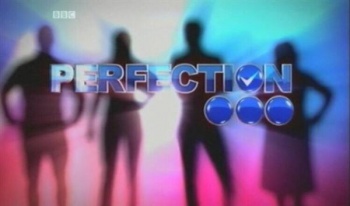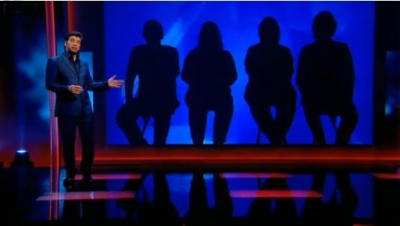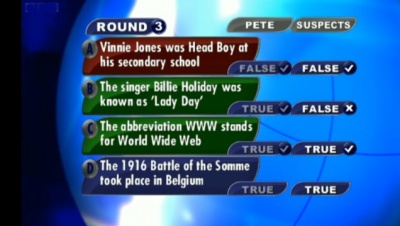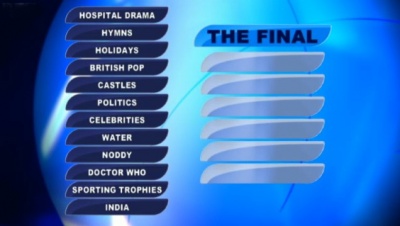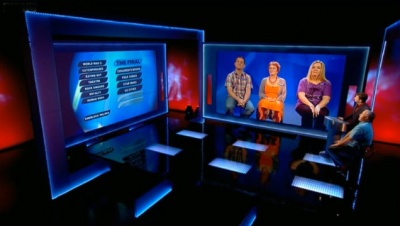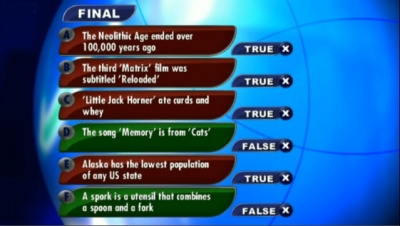Perfection
(Update tx details and explain move wasn't a specific promotion.) |
(→Broadcast) |
||
| Line 8: | Line 8: | ||
== Broadcast == | == Broadcast == | ||
| - | 12 Yard for BBC Two, 17 January 2011 to | + | 12 Yard for BBC Two, 17 January 2011 to 10 February 2012 (60 episodes in 2 series) |
12 Yard for BBC One, 2 January 2013 to present | 12 Yard for BBC One, 2 January 2013 to present | ||
Revision as of 03:46, 2 January 2013
Contents |
Host
Broadcast
12 Yard for BBC Two, 17 January 2011 to 10 February 2012 (60 episodes in 2 series)
12 Yard for BBC One, 2 January 2013 to present
Synopsis
Contestants are asked a series of general knowledge questions, all of which have true or false answers. However should they get just one wrong, then the three other players can steal the game from them. The final sees the contestant in play attempt to win the jackpot, either on their own, or with the help of another player, in return for a share of the jackpot, which starts at £1000 and increases by £1000 each time it is unwon.
Two complete games are played in each 45-minute episode. Each starts with four contestants - "we like to call them The Usual Suspects", says Nick Knowles, whom we like to call Mary Poppins. And we could probably work up a better justification for our renaming than 12 Yard could for theirs. It would appear that the name may be due to the image of the contestants on the screen reminding someone of the poster for said film, though if we're honest, what they really look like is a team who've been banished to the question room having lost all their head-to-heads on Eggheads (another 12 Yard show, of course - callbacks to other 12 Yard programmes will be a frequent feature of this show). Did they ever consider Muppets From Space, we wonder?
So anyway, one of The Living Dead (sorry, which movie was it again?) is randomly selected to take part. The selection is computerised and represented on screen by the names flashing up in quick succession, which looks rather feeble. Another 12 Yard show has a proper random selection device they could borrow, and since they've borrowed just about everything else, it seems a shame not to go the whole hog.
The player has the briefest of brief chats with Mary before the quiz proper begins. In each round there are four true-or-false questions, and the player has 45 seconds to answer them all. Only the first answer counts, and each question has to be answered before the next is revealed.
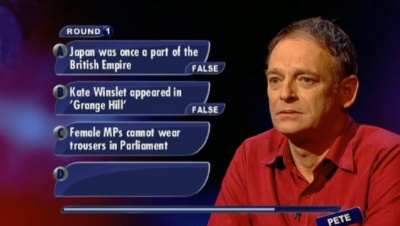 A round in progress. The bar at the bottom of the screen counts down the time by disappearing from right to left.
A round in progress. The bar at the bottom of the screen counts down the time by disappearing from right to left.The Railway Children, who have been isolated in their isolation booth of mega-isolation through the preceding question phase, now get to see the questions and the player's answers. They're asked how they think the player did, though their assessment has no real bearing on the game, and we've never known Mary to pick them up on incorrect assessments (like suggesting the player has achieved perfection, when it turns out they've actually got three wrong). The actual number the player has got right is then revealed. If it's all four, then the player has won that round. If it's zero, then the win automatically goes to Hannah and her Sisters.
If, as is usually the case, the player has got 1, 2, or 3 correct, then The Wild Bunch have an opportunity to achieve perfection by changing the required number of answers from False to True, or vice versa. This being done, Mary goes through the correct answers. If Rita, Sue and Bob Too have got them all right, then they win. Otherwise, nobody wins that round and the reward (which is getting to choose two categories from a list of twelve to add to the selection for the endgame) is carried over to the next.
This is done three times, generating a list of six categories for the endgame. Should the third round be unwon, the final category selections (including any carried forward from previous rounds) are picked alternately by the player and The Three Musketeers.
For the final, the player stands up (no, we don't know why either) and answers the six questions from the categories previously selected. It's the same rules as before - all true-or-false, only the first answer counts, The Flintstones In Viva Rock Vegas don't get to listen in - except that there's no time limit, so the pressure's off and the player can prevaricate as long as they like, provided everyone gets back to the hotel for drinks before bedtime.
With six answers given, Mary turns once again to The Incredibly Strange Creatures Who Stopped Living and Became Mixed-Up Zombies, who in turn get to state, or hint at, how well or badly they think the player did, and, if they so wish, how much of the prize money on offer it would require to induce them to come out of the isolation booth of mega-isolation and provide assistance. On paper (or, indeed, on whatever hi-tech device you're reading this on), this should be an intriguing and exciting part of the show, but actually it tends to be a bit of a damp squib as few offers of assistance are ever forthcoming, most people preferring to let the prize money tick over rather than collaborate for a lesser share.
Finally, Mary goes through the answers (usually leaving those the player was least certain about until last) and the player either gets them all right, thereby achieving perfection and scooping the prize fund, or doesn't, and thereby doesn't, and doesn't.
As a 12 Yard show, this not only shares a lot of elements with previous shows from the same stable, but a lot of the same strengths and weaknesses too. Elements begged, borrowed or stolen from previous shows include the four-question rounds from Beg, Borrow or Steal, the random selection from In It to Win It, the host from Who Dares Wins and the isolation room from Eggheads. As such as it comes across as rather derivative, but what it does have going for it is that, in common with those shows, it's a quiz that's easy to understand and that pretty much anyone can play along with at home. On the down side, it does have that typically 12 Yard issue that the early rounds don't really count for anything, or at least not very much. In theory, it should be an advantage to pick your own categories, but we don't see that panning out in practice; in fact, we'd go so far as to suggest that there may even be a slight negative correlation, i.e. that, counterintuitive though this may be, it seems players actually do better in the endgame when they don't get to pick their own categories. This may be in part due to the tendency of The Stepford Wives to pick the more "off-the-wall" categories which appear to be hard but often turn out to be based on one of the two or three reasonably well-known facts on that subject.
A few little niggles aside though, this is quite an entertaining show. The questions are pitched well, Poppins is a safe pair of hands, and for a show with a little under one question per minute of screen time, the pacing's surprisingly good. Yes, it has issues but hey, what do you want - perfection? Oh... right...
Catchphrases
"On this show, we only pay for perfection." Or after a win, "...we do pay for perfection".
"So you know where this is going." (Once the remaining answers in a round are known but yet to be confirmed.)
Trivia
The series was commissioned for a 30 episode run, and was originally due to be shown in Autumn 2010. However, it was reported that after 26 episodes had been filmed, it was noticed that some contestants in the studio could see a video screen that was supposed to be hidden. The video screen showed the answers to the questions being asked, and therefore could have been used by those contestants to help them in the game, thereby giving them an unfair advantage. As a result, at 12 Yard Productions' expense, the 26 episodes already in the can had to be scrapped, and re-filmed, which resulted in the series being pushed back to January 2011. The third series of Pointless, which was originally due to air after Perfection, aired in its place.
The largest amount of money won on the show was £14,000. This amount was won on 12 January 2012 by Joe and George. Joe was the main game player achieving Perfection in his opening round. The Usual Suspects won the 3rd round choosing four subjects for the final round. George offered £11,000 to help in the final round which Joe accepted and changed one of the answers. This resulted in the pair winning the jackpot with Joe winning £3,000 and George winning £11,000.
It wasn't until show 57, and the 113th game (two games per show, remember?) that somebody, a contestant called Pat, achieved Perfection in all three rounds - though she didn't manage to win the jackpot. After this, it didn't take long for someone to complete the ultimate achievement of Perfection in all three rounds and the final (solo, as well): it happened in the very next game, with contestant Niall answering all 18 questions correctly and taking away a well-deserved £7,000.
At the start of 2013, afternoon entertainment programmes were moved from BBC2 to BBC1. Perfection was included in this exercise.

